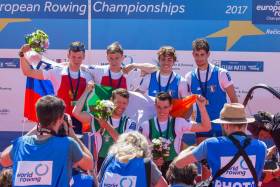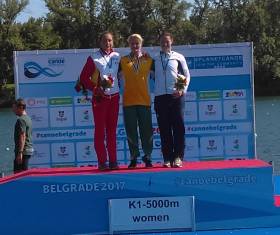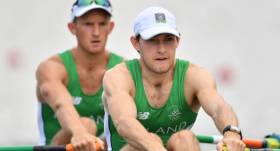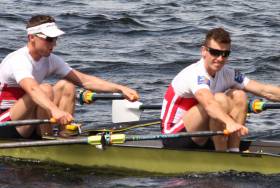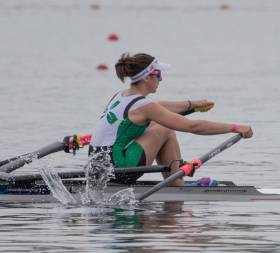Displaying items by tag: World Cup
#Rowing: The Afloat Rowers of the Month for May are Mark O’Donovan and Shane O’Driscoll. The Ireland lightweight pair took gold at both the first World Cup Regatta in Belgrade and, with a remarkable performance, the European Championships in Racice. The two Skibbereen men were disappointed to see the lightweight four, a boat in which they have campaigned, removed from the Olympic programme earlier this year. But they have left this – and international opponents – behind them since.
Rower of the Month awards: The judging panel is made up of Liam Gorman, rowing correspondent of The Irish Times, and David O'Brien, editor of Afloat magazine. Monthly awards for achievements during the year will appear on afloat.ie. Keep a monthly eye on progress and watch our 2017 champions list grow.
Jenny Egan Takes Bronze at World Cup in Serbia
#Canoeing: Ireland’s Jenny Egan took a bronze medal at the canoe sprint World Cup in Belgrade in Serbia today. Australia’s Alyssa Bull took the gold in the K1 5,000 metres from Laia Pelachs of Spain.
Egan (30) started her season with a win in the K1 5,000 at the first World Cup in Montemor-O-Velho in Portugal. She also competed in the second World Cup in Szeged in Hungary.
Canoe Sprint World Cup, Belgrade (Selected Results; Irish interest)
Women
K1 5,000 – Final: 1 Australia (A Bull) 22 minutes 26.080 seconds, 2 Spain (L Pelachs) 22:27.83, 3 Ireland (J Egan) 22:35.60.
Jenny Egan Qualifies for World Cup Final in Portugal
#Canoeing: Jenny Egan qualified for the A Final of the women’s K1 200 metres at the canoe sprint World Cup in Montemor-O-Velho in Portugal today. The Ireland paddler finished third in her semi-final to take the ninth and final place. On Friday, Egan just missed out on qualifying for the final of the K1 500, taking fourth in the semi-final. She will also compete in the K1 5,000 on Sunday.
Canoe Sprint World Cup, Montemor-O-Velho, Portugal (Irish interest)
Women
K1 500 – Heat One: 5 Ireland (J Egan) 1:56.116. Semi-Final (Three to A Final): 4 Egan 1:55.512.
K1 200 – Heat One: 6 Ireland (J Egan) 45.536. Semi-Final (Three to A Final): 3 Egan 42.103.
#Rowing: Paul and Gary O’Donovan took fourth place in the A Final of the lightweight double sculls at the World Cup Regatta in Belgrade today. The British crew of Peter Chambers and Will Fletcher took the race on from the start and led by a length at half way.
They come under pressure from the Czech Republic and Ireland in the second half, but in a scrambling finish the British held on for gold, with the Czechs second and Poland holding off Ireland for bronze.
World Cup Regatta, Belgrade (Selected results; Irish interest)
Men
Lightweight Pair – Final: 1 Ireland (M O’Donovan, S O’Driscoll) 6:46.65, 2 Russia 6:47.67, 3 Britain (J Cassells, S Scrimgeour) 6:48.40.
Lightweight Double Sculls – A Final: 1 Britain (P Chambers, W Fletcher) 6:25.67, 2 Czech Republic 6:26.27, 3 Poland 6:26.63; 4 Ireland (G O’Donovan, P O’Donovan) 6:27.12, 5 Netherlands One 6:32.83, 6 Spain 6:38.41.
Women
Lightweight Single Sculls – A Final: 1 Switzerland (P Merz) 7:52.30, 2 Ireland (D Walsh) 7:56.24, 3 Poland (J Dorociak) 7:59.22.
Denise Walsh Takes World Cup Silver For Ireland
#Rowing: Denise Walsh took silver for Ireland at the World Cup Regatta in Belgrade this morning. The Skibbereen woman, who had won her heat with a wonderful finish, came through the field to take second behind Patricia Merz of Switzerland. Merz had established a clear lead with a quarter of the race to go, and Walsh lay in fourth at this stage. But she upped her rate, moved into medal position and then passed Poland’s Joanna Dorociak to take a second medal for Ireland. The men’s lightweight pair had earlier taken gold.
“In the race, I focused on giving a bit of reserve toward the end and focusing on the sprint. I didn’t realize how close everyone was to me, especially Patricia. Now focusing on the European Champs in the single,” Walsh told worldrowing.com.
World Cup Regatta, Belgrade (Selected results; Irish interest)
Men
Lightweight Pair – Final: 1 Ireland (M O’Donovan, S O’Driscoll) 6:46.65, 2 Russia 6:47.67, 3 Britain (J Cassells, S Scrimgeour) 6:48.40.
Women
Lightweight Single Sculls – A Final: 1 Switzerland (P Merz) 7:52.30, 2 Ireland (D Walsh) 7:56.24, 3 Poland (J Dorociak) 7:59.22.
Gold for O'Driscoll and O'Donovan at World Cup
#Rowing: Ireland won the first gold medal of the World Cup Regatta in Belgrade this morning through an outstanding performance by Mark O’Donovan and Shane O’Driscoll in the lightweight pair. They took on and beat the Britain crew of Joel Cassells and Sam Scrimgeour – who in a tight finish could not hold second and finished third behind Russia.
O'Donovan told the official worldrowing site that they felt good during the race and gave credit to Dominic Casey, who is now the Ireland head coach. "Going forward we are going to a training camp in Varese and looking to implement new training and technique before Europeans.”
Cassells said: “We knew it was going to be a challenge. It was a pretty hard finish. The plan is to learn, the future is to get to the European Championships and retain the title.”
World Cup Regatta, Belgrade (Selected results; Irish interest)
Men
Lightweight Pair – Final: 1 Ireland (M O’Donovan, S O’Driscoll) 6:46.65, 2 Russia 6:47.67, 3 Britain (J Cassells, S Scrimgeour) 6:48.40.
#Rowing: A mini-storm which damaged the starting pontoon caused the abandonment of Friday's afternoon session of the World Cup regatta in Belgrade. Mark O’Donovan and Shane O’Driscoll had been set to compete in the repechage of the men’s pair. This race has now been scrapped. Poland, for medical reasons, and Ireland were allowed to withdraw fom the draw. The men’s pair semi-finals will go ahead on Saturday, with the two crews which did not qualify directly allowed to row in the semi-finals.
There will be a race for lanes in the lightweight men’s pair at 9.06 Irish time on Saturday. The final is set for 9.10 Irish time on Sunday.
Puspure Set for Repechage at World Cup Regatta
#Rowing: Ireland’s Sanita Puspure finished third in her heat of the women’s single sculls at the World Cup Regatta in Belgrade today. The single qualifying place for the A Final was taken by Magdalena Lobnig of Austria, who held off the challenge of Ekaterina Karsten of Belarus. Puspure finished a clear third and will go on to a repechage with Karsten.
Jeanine Gmelin of Switzerland won the other heat convincingly.
World Cup Regatta, Belgrade Serbia, Day One (Selected Results; Irish interest)
Men
Pair – Heat Two (First Three to A/B Semi-Finals; rest to Repechage): 1 Britain 6:42.81, Netherlands 6:46.34, 3 Spain 6:50.69; 4 Ireland (M O’Donovan, S O’Driscoll) 6:53.50.
Women
Single Sculls – Heat Two (Winner to A Final; rest to Repechage): 1 Austria (M Lobnig) 7:49.47; 2 Belarus (E Karsten) 7:51.74, 3 Ireland (S Puspure) 7:53.20.
Lightweight Single Sculls – Heat Two (First Two to A Final; rest to Repechage): 1 Ireland (D Walsh) 8:07.51, 2 Poland (J Dorociak) 8:08.22; 3 Switzerland Two 8:11.65
#Rowing: Shane O’Driscoll and Mark O’Donovan finished fast but could not nail down a place in the top three in their heat of the men’s pair at the World Cup Regatta in Belgrade this morning. The Ireland lightweight pair competed in this more difficult event to up their competitive programme. Three crews of the four qualified directly for the semi-finals and Ireland stayed close to the top three for much of the race. Coming up to the line Britain, the Netherlands and Spain had the places collared, despite a good sprint by O’Driscoll and O’Donovan.
World Cup Regatta, Belgrade Serbia, Day One (Selected Results; Irish interest)
Men
Pair – Heat Two (First Three to A/B Semi-Finals; rest to Repechage): 1 Britain 6:42.81, Netherlands 6:46.34, 3 Spain 6:50.69; 4 Ireland (M O’Donovan, S O’Driscoll) 6:53.50.
Women
Lightweight Single Sculls – Heat Two (First Two to A Final; rest to Repechage): 1 Ireland (D Walsh) 8:07.51, 2 Poland (J Dorociak) 8:08.22;
3 Switzerland Two 8:11.65
#Rowing: Denise Walsh gave Ireland a tremendous start to the World Cup Regatta in Belgrade today. The Skibbereen woman came from way down at 1500 metres to win her heat and qualify directly for the final of the lightweight single sculls. Through most of the middle of the race Joanna Dorociak of Poland seemed to have the race won with some ease and Pauline Delacroix of Switzerland filled the second qualifying spot. But Walsh upped the rate to over 40 strokes a minute in the final 500 metres and passed both women.
Patricia Merz of Switzerland dominated the other heat, with Russia’s Anastasia Lebedeva taking the other A Final place available in that race.
World Cup Regatta, Belgrade Serbia, Day One (Selected Results; Irish interest)
Women
Lightweight Single Sculls – Heat Two (First Two to A Final; rest to Repechage): 1 Ireland (D Walsh) 8:07.51, 2 Poland (J Dorociak) 8:08.22; 3 Switzerland Two 8:11.65


























